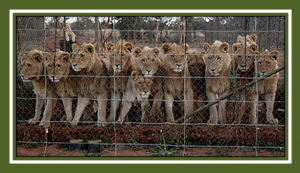News
Latest Lion Aid News
The "Con" in Conservation
Saturday 10th August 2013
 Thanks to the South African Broadcasting Corporation, a recent two-part series was aired by the Special Assignment team on the captive lion breeding industry in SA. The Con in Conservation Part 1 The Con in Conservation Part 2 Everyone should take the time to watch both episodes, and see for themselves what that sordid industry entails. The programmes capture well the caginess of Pieter Potgieter (South African Predator Breeding Association) and the iciness of Adri Kitshoff (Professional Hunter’s Association of South Africa) and Thea Carroll (Department of Environmental Affairs). Balanced against the evident truths spoken by Chris Mercer, Karen Trendler and Fiona Miles. After watching these programmes, anyone so naïve as to think that spending money “volunteering” with any South African organization promoting cub petting, walking with lions, raising “orphaned” lions, etc, etc is actually doing the lions any good should have their head carefully examined by a qualified psychologist. Similarly, any organization selling such programmes to “volunteers” should have the belated opportunity to examine their conservation consciousness. Bottom line – don’t support the breeding farms and put them out of business. Stopping the canned hunting is another kettle of fish. However, raising a lion to the age where it can be hunted is an expensive business, hence all the cub petting, lion walking and volunteering to set off the costs. If that option for making money from lions before they are hunted is taken away, the canned hunting operators will have to bear the full cost of raising the lions by themselves. As the biggest attraction these days to trophy hunters is the lesser cost of a canned lion compared to hunting a wild lion, the more expensive canned lion hunting gets the fewer takers there will be. Will this impact on wild lions? If canned lions are now more expensive will people hunt more wild lions because of the roughly equivalent trophy cost? Not really. Unlike canned hunting, wild lion hunting comes with no guarantees. Some lion range states are making wild lion hunting more difficult by implementing age minima and penalizing hunters for shooting underage lions. Regardless of whether or not the fanciful scheme of hunting lions older than 6yrs actually makes the practice sustainable, it does place a burden on the hunters. Since there are now very few lions of that age left in hunting concessions due to past excesses, the failure rate of a wild lion safari is going up. As that still means you have to pay for a 14 to 21-day safari, fewer and fewer hunters are signing up for a wild lion hunt. In addition, if the range states would disallow the cowardly practice of shooting lions on baits from a blind, it would be even more difficult (and expensive) to bring home a wild lion. We are totally opposed to lion trophy hunting, but would meanwhile support more and more layers of difficulty (actually in line with the supposed conservation hunter’s ethos of “fair chase”) until the needed bans are imposed. The current “supermarket” approach to lion hunting (walk in, pay and walk out with a trophy) has evolved out of a need for guaranteed satisfaction. That should never apply to any trophy hunt. The fewer successful hunts there are the fewer hunters will sign up because it might actually require more money and effort. So stop canned hunting by cutting off the supply chain of cubs from breeders and make wild lion hunting more difficult and expensive. If lions are seen as a commodity by those who would exploit them, let’s use economic means to defeat the practice. Categories: Trophy Hunting, Domesticating Animals |
Posted by Chris Macsween at 16:46
No comments have been posted yet.
Add a new comment
Existing user
New user sign up



